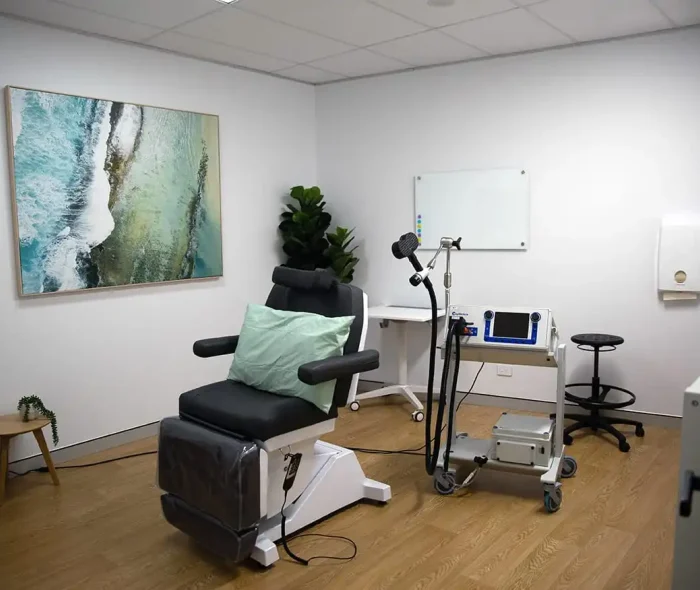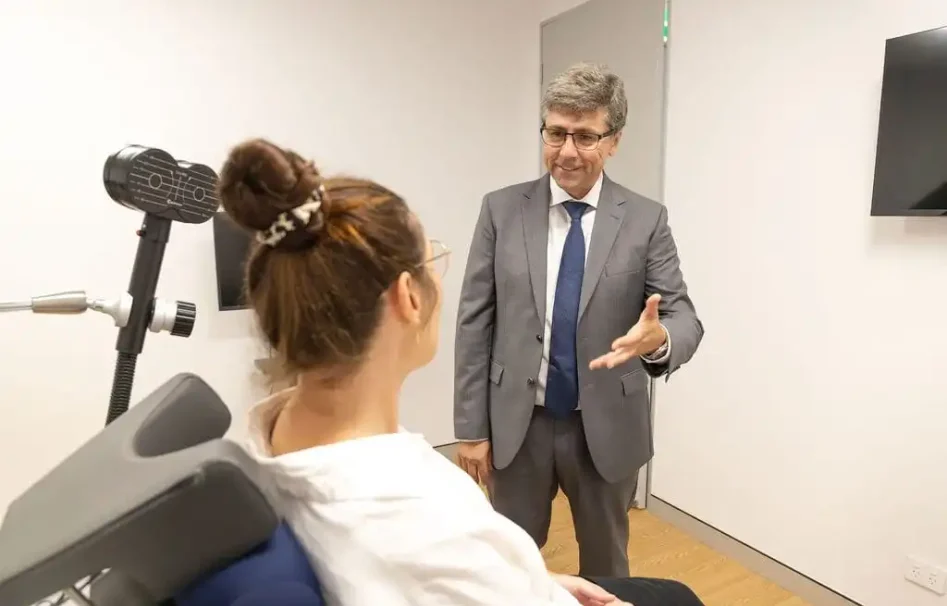A non-invasive, drug-free treatment for depression
A new and effective treatment for people who haven’t had success with antidepressants. Discover TMS treatment at Brain & Mind Hub.
What is TMS?
Transcranial Magnetic Stimulation (TMS) is a medication-free treatment that uses gentle magnetic pulses to stimulate areas of your brain.
It is a safe and effective alternative treatment for people with treatment-resistant depression and those who haven’t found relief through traditional therapies such as medication and talk therapy.
Studies show that TMS treatment is highly effective and can offer significant relief from depressive symptoms.
Many people experience total remission from depression with TMS.
How does TMS work?
TMS delivers targeted stimulation to small areas of the brain associated with mood regulation, all without the need for surgery or medication.
During the procedure, a magnetic coil is placed against the scalp to stimulate a specific region of the brain. This coil generates magnetic pulses that penetrate the brain tissue, producing minor electrical currents that activate the superficial layers of the brain. When the stimulation reaches sufficient intensity, brain cells fire and influence deeper structures implicated in depression.
Most individuals do not find TMS painful, though you may notice slight involuntary twitches in muscles around the forehead, eyes, or scalp, as well as a mild tapping sensation beneath the coil.
Brain & Mind Hub is the only clinic offering three different TMS protocols—Standard, Accelerated, and Intensive. The primary distinction among these options lies in the treatment schedule, enabling us to provide greater flexibility to suit both your lifestyle and recovery goals.

What can TMS help with?
Numerous studies have shown TMS to be effective in providing relief for people who are experiencing one or more of the following:
Is TMS right for me?
TMS is generally well-tolerated and suitable for people over 18 who have been assessed as eligible by a psychiatrist.
We are committed to providing proven and effective neuroscience-driven mental healthcare to all who need it. If TMS is not the right solution for you, we will work with you to explore other treatment options that are suitable.

Getting started with TMS therapy at Brain & Mind Hub
Brain & Mind Hub is the only clinic to offer three different protocol options: Standard, Accelerated and Intensive. The main difference between the protocols is the schedule of individual treatments.
Each treatment takes approximately 4 minutes, and the number of treatments will be determined by the protocol you are undertaking.
Research suggests that the Accelerated and Intensive protocols are slightly more effective in treating symptoms of depression.
You and your clinician will discuss your lifestyle and treatment aims to help determine which protocol is the best fit.
Our TMS protocols
Referral
A psychiatrist or GP needs to provide a referral for TMS treatment.
This can be provided by your current psychiatrist, or you can make an appointment to see one at BaMH.
Assessment
One of our specialists will establish your resting motor threshold by stimulating a small area of your brain.
This establishes your individualised treatment dose to maximise the effectiveness of your TMS treatment.
Treatment
During a TMS session you will be awake, alert and aware of what is happening at all times, and will sit in a comfortable reclining chair.
On treatment days you able to drive yourself to and from the treatment appointment and enjoy a normal day either side of treatment.
TMS FAQ’s
How quickly will I see results?
Most people who respond to TMS start to feel different after 10 treatments. The full treatment response usually occurs after approx. 15 treatments, but this can vary depending on individual characteristics.
Is TMS therapy safe?
Extensive research indicates that TMS is safe and free from long-term side effects, although there may still be unknown risks. The primary adverse effect associated with TMS is the potential to induce a seizure. However, the likelihood of this occurring is approximately 1 in 30,000 treatments, thanks to current protocols and proper coil placement.
Our team consists of leading experts in TMS treatment with extensive experience delivering safe, personalised treatment plans that align with each individual’s unique neurobiology.
How quickly will I see results?
Newer accelerated TMS protocols have reported remission rates of approximately 80% in patients with treatment-resistant depression. This approach, which administers multiple sessions over a condensed period, offers a rapid and robust response.
In contrast, traditional antidepressants generally yield remission rates of around 30%, underscoring the potential advantage of accelerated TMS for individuals who have not achieved sufficient improvement with conventional therapies.
How much does TMS cost?
Cost of treatment can vary depending on a number of factors, including individual diagnosis, the treatment plan you intend to undertake, and your previous experience with other treatments. You may also be eligible to have treatments covered by Medicare, NDIS or DVA depending on individual circumstances.